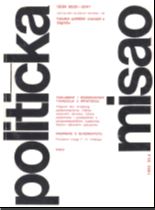Odnos Zastupničkog i Županijskog doma Sabora Republike Hrvatske
The Relationship Between the House of Representatives and The House of Counties in the Croatian Parliament
Author(s): Štefica Deren-AntoljakSubject(s): Politics, Political history, Government/Political systems, Transformation Period (1990 - 2010)
Published by: Fakultet političkih znanosti u Zagrebu
Keywords: Croatia; house of representatives; house of counties; relationship; parliament;
Summary/Abstract: The author devotes the first portion of the article to an analysis of several modem ’two-house’ parliamentary systems, and shows the factors influencing their formation in federal and unitary states. An analysis of the relationship between the two houses in some political systems leads to the conclusion that this system has considerable influence in federal countries (with the exception of Austria), while there is considerably less influence upon unitary states - where the role of the first house is considerably greater than that of the second in law-making and executive functions. The second portion of the article is an analysis of the relationship between the Representatives’ House and House of Counties in the Croatian parliament. Although a two-house system by definition, it lacks equality between the two houses in the law-making process and their stance towards the executive. They each have different powers, their members are elected in different ways, and their relationship with the executive differs. This parliament can be characterized as an asymetrical two-house parliamentary system. Although the House of Counties can initiate laws, it cannot by law, pass laws. Thus, the House of Counties is seen as a suggestive, advisory, and in some degree, a supervisory body with the right of veto, and as a house through which regional interests are articulated and represented. Although the real centre of power is in the hands of the State and the President, and not in the parliament - since the Croatian political system is based upon a concept of imbalance favouring the executive - the new Parliament is the real framework for fundamental and long-term political, economic, and institutional transformation in Croatia as seen by the intensive legislative, supervisory and legitimate functions of the past two years.
Journal: Politička Misao
- Issue Year: XXX/1993
- Issue No: 04
- Page Range: 74-86
- Page Count: 13
- Language: Croatian

